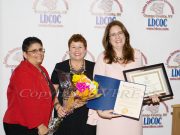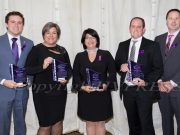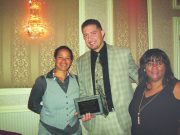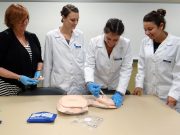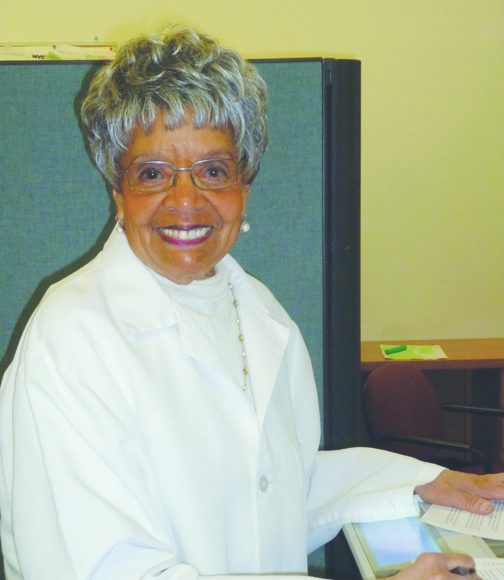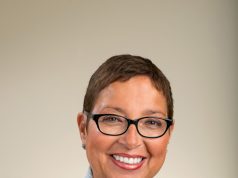Margaret A. Wyke, manager of the health clinic at New York City’s Covenant House, was the first (and only) African American woman to serve as the health administrator at Sing-Sing Correctional Facility, working there in the mid 1980s, just as the AIDS epidemic was taking a steep toll on inmates. Mrs. Wyke’s job was to open up an AIDS unit at the prison and reduce lawsuits against the prison. It was groundbreaking work, and heartbreaking as well. Between 1983 and 1985, 35 of the 45 men in the AIDS unit died.
Finding hospitals to treat them was difficult as well.
In 1985, Mrs. Wyke met Mother Teresa, who was visiting the prison and convinced St. Clare’s Hospital to admit three inmates dying of AIDS.
“That was the most awesome experience I’ve ever had,” Mrs. Wyke said. “Mother Teresa was the tiniest little lady, only about 4-foot-10, full of grace, and spirituality. You just felt, Oh my God, this is one of God’s angels.”
Ten years ago, after retiring from the Department of Corrections, she was “bored to death” being at home, so she answered an ad for a health administrator for Covenant House. Working with homeless young adults was intense.
“To think these kids are homeless and lived out on the street, it made me do a double-take,” she said. “In corrections, all the men or women had done something and were paying the price for it, but they knew better. And I found a lot of these kids didn’t know right from wrong, which was hard to believe. They had no relationships with their parents.
This was very, very upsetting. I would go home taking deep breaths.”
She enjoys her work, keeping track of the clinic’s vital statistics for the clinic. She also jumps in when the waiting room gets too full, to help read tuberculosis test results and talk to kids with colds. And she continues counseling people with AIDS, advising them how to keep up with their medications, no easy task when their housing situation is precarious.
“If you follow the protocol and the medications, you can stay healthy”, she tells them.
“You also have to watch your behavior. They say, ‘OK, Grandma. OK, Mom.’ But I’m telling you the absolute truth. If you pass this on, then you are as guilty as the person that passed it on to you. I try to make it realistic. This is the real world, not a fantasy.”
One of her very first jobs was at Horn & Hardart, the automat company, which had employed her father. The man who interviewed her was taken aback when she arrived for the interview.
“When I walked in there, this was 1965, he said, ‘I didn’t know you were colored,’ and I said, “Yes, but I can be the best you’ve ever hired.’ He said ‘Well I’ll be damned, you’ve got some nerve,’ and I said, ‘Well, I’ll try to be the best.’”
During Black History Month, she thought about how relations could be better among the races. “When I was 18 or 20 or 30 I never thought I would see a black president, so all things are possible,” she said. “But a lot of middle aged black folks need to do more for their kids as far as attending PTA meetings and looking at their homework.” Her father did that, and two of Mrs. Wyke’s siblings became doctors, with two others earning their Ph.D.’s. Her own daughter has a doctorate in education.
Overall, she worked in 26 different prisons. “They were angry and forceful and fighting among themselves,” she said. When she sees Covenant House residents starting to act that way, she brings them into her office and asks if she can help them. She’ll say, “I’m here to help you. We’re here to serve you. This is the mission of Covenant House. But to get angry and frustrated and start cursing everybody out, that doesn’t help. Tell me what I can do to help you.”
Despite her age, and some health problems, she seldom takes a sick day.
“I can’t stop working. This is me. I’m a cancer survivor. I just finished chemotherapy in 2010, and 25 radiation treatments every single day,” she said. She didn’t miss many days at work, even though her supervisors are telling her she has amassed too much time off and needs to use some of it. After a good checkup a month ago, she says, “I’m doing fine. I can’t complain.”
Of all her jobs, she calls her position at Covenant House “the most awesome – because it touches your heart.”




